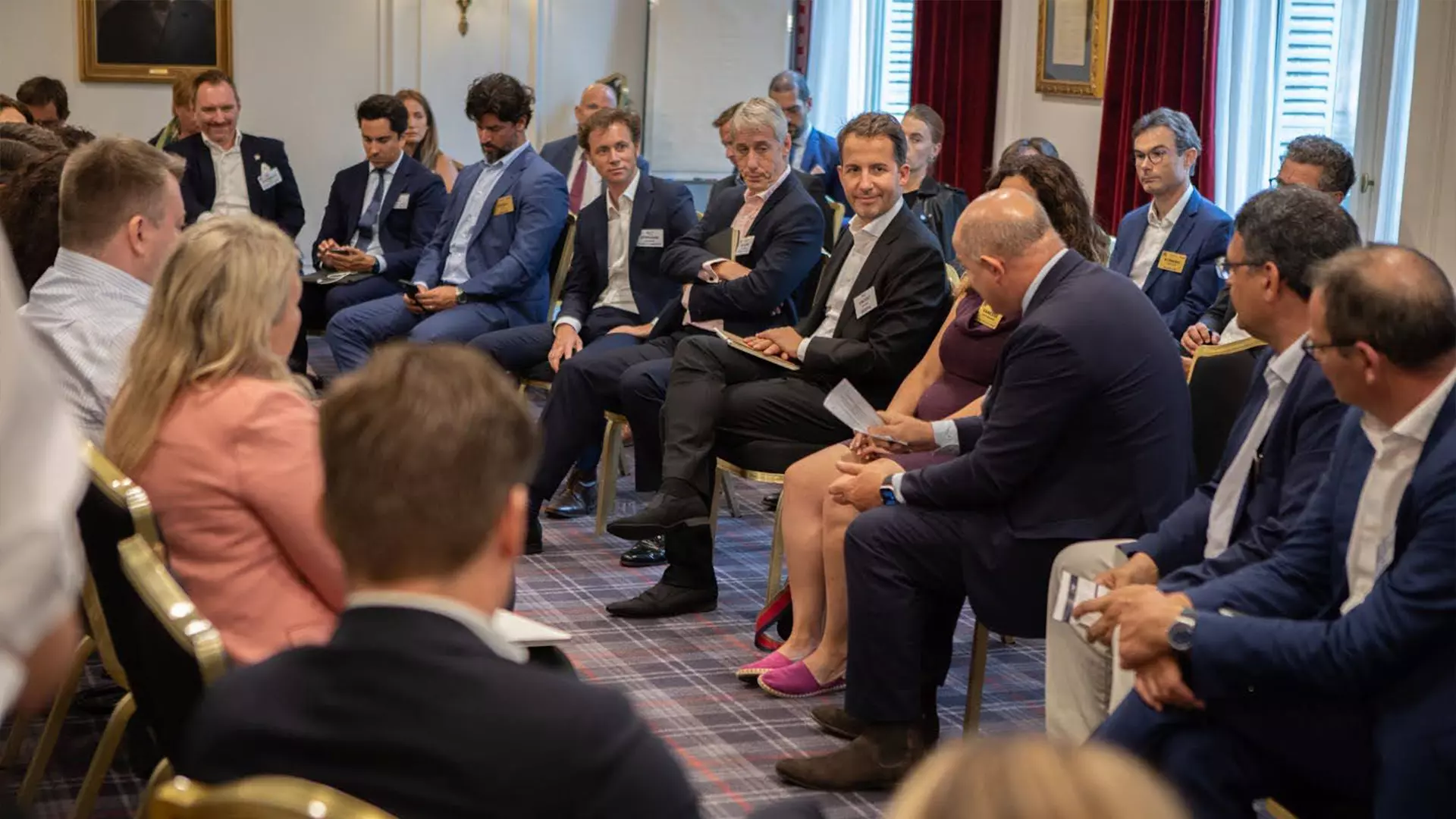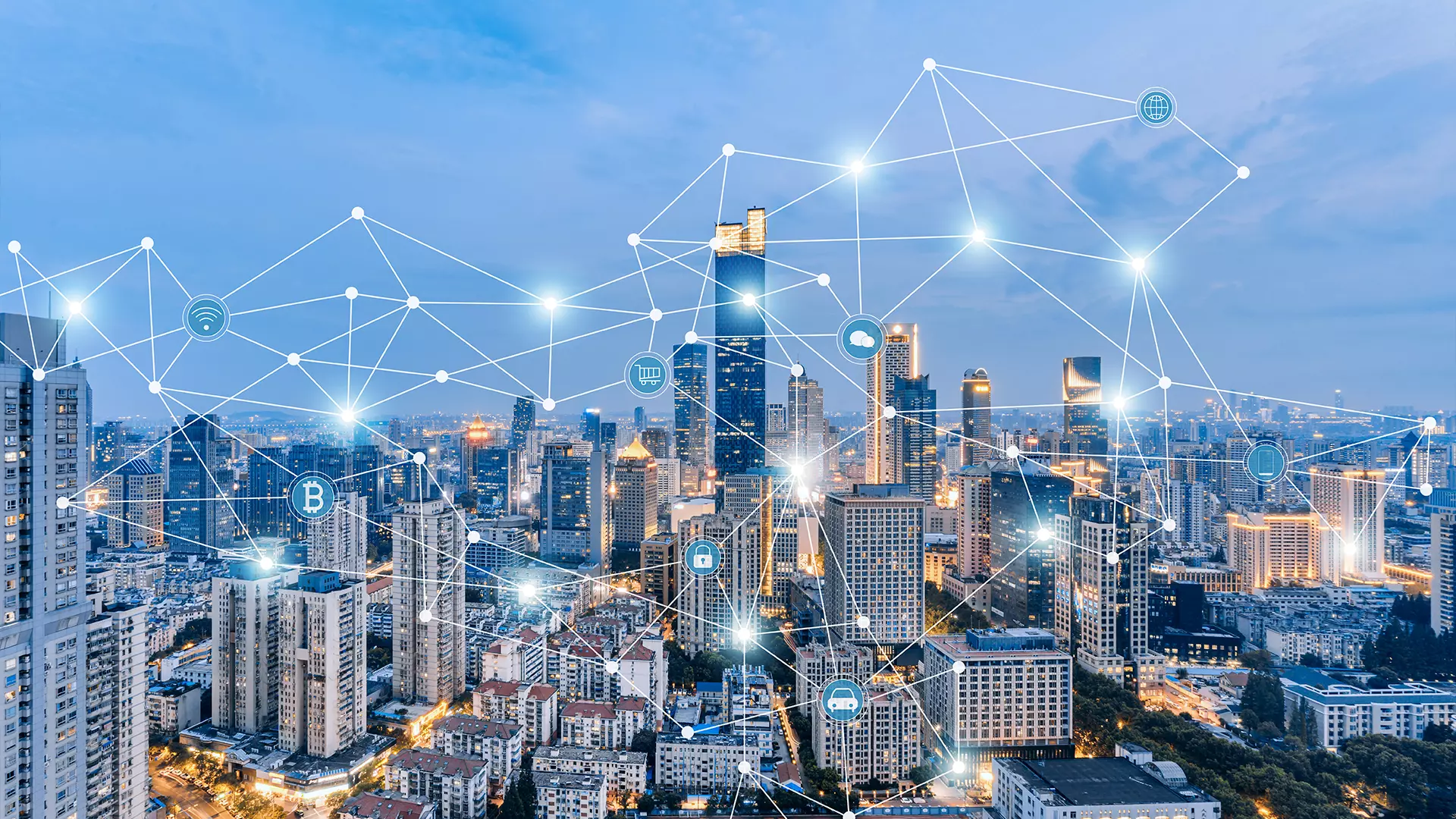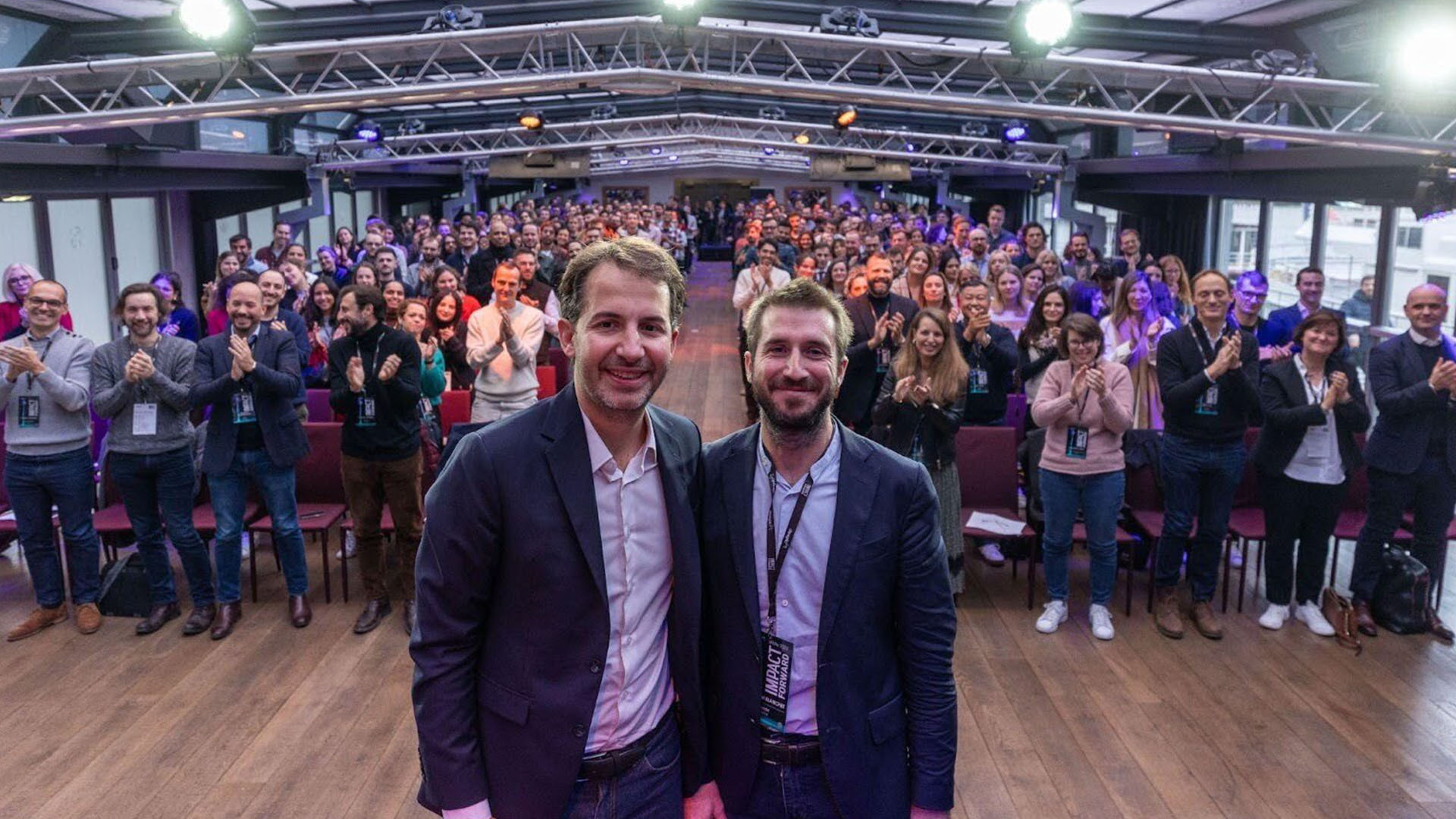 Credit: leungchopan | envato
Credit: leungchopan | envatoVincent Bryant, Deepki: How will the real estate industry reach net-zero?
CEO & Co-Founder of Deepki, Vincent Bryant, addresses importance of auditable data, AI, and retrofitting on the path to net-zero
September 6, 2024Real Estate
Written by Helen Richards
As the world intensifies its efforts to meet net-zero emissions targets, the real estate sector - responsible for 40% of global emissions - requires urgent and decisive action. Vincent Bryant, CEO & Co-founder of Deepki, the complete ESG platform for real estate, sat down with GRI Club ahead of his participation at Europe GRI 2024, to share his perspectives on the size of the challenge and how to tackle it.
We’ve heard it before, and we’ll hear it again, data is fundamental in addressing the environmental challenges within real estate. Validating the energy performance of assets is crucial to understanding how to improve energy efficiency and carbon footprints, but this requires high-quality data.
The real estate industry has previously been noted for lacking such reliable data, which is where Deepki’s platform is changing the game. As the only ESG data intelligence platform to have obtained the ISAE 30001 Type 1 attestation for the credibility and accuracy of data collection, the quality of the data it gathers is comparable to that of financial data.
Besides this high quality data, Deepki leverages AI to not only enhance productivity but also predict buildings’ energy consumption, detect anomalies, and gap-fill where necessary data is missing, based on each building’s unique criteria. This combination allows for high-level decision-making supported by a thorough understanding of the real impact and ROI of specific actions, including individual retrofitting measures and their projected impact on a building’s liquidity in line with the CRREM framework.

Introduce Deepki and the solutions you offer for real estate assets.
“Deepki’s end-to-end solutions allow visionary real estate owners and investors to take control of their ESG performance. The complete, market-leading ESG platform, coupled with an expert team of environmental consultants, enables organisations to stay ahead of the curve by measuring and managing the sustainability of their assets in line with regulations, tackling both physical and financial climate risk, developing impactful ESG strategies and implementing carbon pathways to reach net zero.
By directing the flow of capital to support the environmental transition, companies are equipped to protect the value of their assets and create virtuous real estate. The platform is supported by over 150 ESG and carbon specialists who partner with clients across data collection and analysis, through ESG strategy definition and the implementation of net zero trajectories.”
How would you describe the current European real estate industry in relation to sustainability? How prioritised is it among key players?
“The current European real estate industry places significant emphasis on sustainability, driven by both regulatory pressures and market demands, with a direct correlation between ESG performance and asset value, as non-performant buildings risk “brown discounting” and stranding.
Investors need to align with local and international regulations, and investors are looking for properties with high energy efficiency and low carbon footprints. There is also a growing demand for buildings with green certification and ratings, as these enhance the marketability of properties. Finally, sustainable buildings have lower operating costs and higher occupancy rates, which makes them more attractive investments.
Poor ESG performance now acts as a barrier to capital, with lenders asking companies to demonstrate their commitment to the environmental transition through the implementation of carbon pathways. Sustainable buildings are considered less risky investments because they are better positioned to comply with future regulations and are less likely to suffer from depreciation related to environmental issues.
Our research revealed that one of the driving forces behind getting real estate retrofitted and more sustainable are the occupiers of those buildings. Companies are keen to demonstrate their commitment to sustainability. Alongside this, it’s recognised that sustainable buildings often offer cost savings through reduced utility costs and healthier environments that can enhance employee well-being and productivity.”
How realistic is the path to net-zero for the real estate industry? Where are the major challenges and what needs to be done?
“The scale of the challenge is enormous. Real estate is responsible for 40% of all global carbon emissions and is under significant pressure to reduce this and meet the net zero target by 2050. If the world is to meet its net zero emissions targets, the real estate sector must take urgent and decisive action to bring about significant change.
Recent research commissioned by Deepki reveals that the financial threat managers face from holding commercial real estate with poor ESG performance is all too real. Over half of respondents claimed that over 30% of their assets are currently stranded. These are buildings that have lost their value due to poor energy performance.
There’s a lack of in-house expertise and experience making it hard to know how to tackle the problem and where best to direct capital flow to achieve the greatest impact. It’s difficult for companies to know which actions to prioritise in order to guarantee the highest return on investment. Progress is further hindered by a lack of alignment across the industry due to the absence of a common framework.”

What is the role of data on the path to net-zero?
“The focus on ESG and transitioning to net-zero means that asset owners need to validate the performance of their assets when it comes to energy efficiency and carbon footprint – this requires real data.
Where underperformance needs to be addressed, high quality, auditable data is vital in establishing an investment plan, whereas many initiatives are reliant on declarative data which lacks reliability. Deepki has addressed this by obtaining the ISAE 3000 Type 1 attestation, guaranteeing that the data it collects is audit-ready, being held to the same standard as financial data.”
What role does retrofitting play on the path to reducing the real estate industry’s carbon footprint?
“Current estimates put the proportion of 2050’s built environment already in existence at around 80%. This, coupled with the embodied carbon generated by the construction of new buildings - even the greenest - means that we simply have to address the performance of today’s building stock if we are to meet the objectives of the Paris Agreement.”
How can asset managers ensure they are prioritising the most effective retrofitting actions?
“With so much to do, one of the key challenges is knowing where to start. This is why it is imperative for companies to be able to evaluate the ROI of individual retrofitting actions.
Deepki alleviates confusion by analysing the impact of specific actions through virtual retrofits, so that companies can assess the impact of investments on their portfolio in the long-term, in line with the CRREM pathway. I.e. If I invest X euros on replacing the HVAC equipment by a certain date, I can ensure that I avoid stranding by a given date, for example.
Bringing this level of clarity to the picture ensures companies can effectively prioritise investments and direct the flow of capital to where it matters most.”
What are some of the most crucial retrofits in older assets? Which can make the biggest difference?
“Reinforcing building insulation is highly effective in improving an asset’s existing carbon footprint. Optimising the regulation of lighting, heating, ventilation and air conditioning equipment is also key, as well as replacing existing equipment with more efficient models.
This being said, it is important not to underestimate the role of behaviour and how we use equipment. For instance, even the most sophisticated heat pump can consume just as much as the older, inefficient equipment it replaced if it is not used correctly.
The more complex the building and its HVAC equipment, the more important it is to ensure proper performance. PropTech, such as Deepki, facilitates this, by comparing consumption before and after retrofits, as well as theoretical and true consumption.”
How can the real estate industry ensure auditable data on ESG standards, and ensure data that meets the same standards as financial data? Why is this important?
“Deepki is the only ESG data intelligence platform to have obtained the ISAE 30001 Type 1 attestation for the credibility and accuracy of its data collection process, making it fully auditable and providing the same, high quality standards as financial reporting.
We sought accreditation as part of our commitment to offer the industry a standard for complete, reliable and relevant ESG data, helping the sector make the right decisions to tackle the climate
change challenge. Clients can have the highest degree of confidence in their data and Deepki’s collection process, which was audited by KPMG.
Data is key to making informed, strategic decisions, and is an integral part of Deepki’s framework. We see ourselves as the backbone of ESG for real estate, from data collection, through analysis and reporting, to taking action and measuring impact.
Data has been a part of Deepki’s journey from the outset, and since then our vision has evolved to address real estate’s environmental transition in its entirety, through a combination of technology, in-house expertise, and a wide ecosystem of partners and complementary technologies, centralised through Deepki to achieve the common goal of creating virtuous real estate. It takes a village and we need all hands on deck.”

How will AI play a role in data collection and analysis going forward?
“We can achieve some truly amazing things with AI; while it’s not the whole picture, and will not decarbonise the built environment alone, it’s a highly powerful tool that revolutionises productivity, saving time and providing additional insights on a large scale.
At Deepki, we leverage AI to improve our internal operational efficiency, and to enhance the products and services we offer, notably through data enrichment. One example is gap-filling; there’s always a tenant who refuses to share data, or a malfunctioning metre. Thanks to AI, we can run algorithms to estimate this missing data much more accurately than a human could.
Another example is predicting a building’s energy consumption to compare it with its peers, based on certain criteria. This is very useful because comparisons often involve elements that aren't strictly comparable, such as averages, which are misleading. These statistical algorithms help in making such comparisons. We leveraged the same technology to develop the ESG Index, the only freely accessible benchmark of the industry’s environmental performance, with a machine-learning prediction algorithm.
A highly practical use-case for AI is anomaly detection. Here, we use load curves and metres to detect issues such as equipment not shutting down overnight or abnormal overconsumption, providing users with insights to regulate the use of their building and correct these issues. To do this, we gather data from 2.5 million metres daily. The power of AI lies in feeding the algorithm a year's worth of data and having it identify what's wrong thanks to pattern recognition. This is simply not feasible manually.
Of course, this is an accumulation of micro use cases, and doesn’t replace skilled workers, equipment replacement or changes in behaviour. However, we remain convinced of the power of AI and the role it will play in the future.
In terms of the number of use cases, data quality, and the volume of our learning base, we have the largest database in the world and the biggest portfolio of buildings, which means we’ve accumulated a lot of experience.”
Join Vincent and 700+ other leading real estate industry experts, including investors, lenders, and operators, at the annual Europe GRI 2024 in Paris on 10-11th September.
As the world intensifies its efforts to meet net-zero emissions targets, the real estate sector - responsible for 40% of global emissions - requires urgent and decisive action. Vincent Bryant, CEO & Co-founder of Deepki, the complete ESG platform for real estate, sat down with GRI Club ahead of his participation at Europe GRI 2024, to share his perspectives on the size of the challenge and how to tackle it.
We’ve heard it before, and we’ll hear it again, data is fundamental in addressing the environmental challenges within real estate. Validating the energy performance of assets is crucial to understanding how to improve energy efficiency and carbon footprints, but this requires high-quality data.
The real estate industry has previously been noted for lacking such reliable data, which is where Deepki’s platform is changing the game. As the only ESG data intelligence platform to have obtained the ISAE 30001 Type 1 attestation for the credibility and accuracy of data collection, the quality of the data it gathers is comparable to that of financial data.
Besides this high quality data, Deepki leverages AI to not only enhance productivity but also predict buildings’ energy consumption, detect anomalies, and gap-fill where necessary data is missing, based on each building’s unique criteria. This combination allows for high-level decision-making supported by a thorough understanding of the real impact and ROI of specific actions, including individual retrofitting measures and their projected impact on a building’s liquidity in line with the CRREM framework.

Vincent Bryant (centre) will be co-chairing the Net Zero Assets panel at Europe GRI 2024 on September 10-11th in Paris. (Credit: GRI Club)
Introduce Deepki and the solutions you offer for real estate assets.
“Deepki’s end-to-end solutions allow visionary real estate owners and investors to take control of their ESG performance. The complete, market-leading ESG platform, coupled with an expert team of environmental consultants, enables organisations to stay ahead of the curve by measuring and managing the sustainability of their assets in line with regulations, tackling both physical and financial climate risk, developing impactful ESG strategies and implementing carbon pathways to reach net zero.
By directing the flow of capital to support the environmental transition, companies are equipped to protect the value of their assets and create virtuous real estate. The platform is supported by over 150 ESG and carbon specialists who partner with clients across data collection and analysis, through ESG strategy definition and the implementation of net zero trajectories.”
How would you describe the current European real estate industry in relation to sustainability? How prioritised is it among key players?
“The current European real estate industry places significant emphasis on sustainability, driven by both regulatory pressures and market demands, with a direct correlation between ESG performance and asset value, as non-performant buildings risk “brown discounting” and stranding.
Investors need to align with local and international regulations, and investors are looking for properties with high energy efficiency and low carbon footprints. There is also a growing demand for buildings with green certification and ratings, as these enhance the marketability of properties. Finally, sustainable buildings have lower operating costs and higher occupancy rates, which makes them more attractive investments.
Poor ESG performance now acts as a barrier to capital, with lenders asking companies to demonstrate their commitment to the environmental transition through the implementation of carbon pathways. Sustainable buildings are considered less risky investments because they are better positioned to comply with future regulations and are less likely to suffer from depreciation related to environmental issues.
Our research revealed that one of the driving forces behind getting real estate retrofitted and more sustainable are the occupiers of those buildings. Companies are keen to demonstrate their commitment to sustainability. Alongside this, it’s recognised that sustainable buildings often offer cost savings through reduced utility costs and healthier environments that can enhance employee well-being and productivity.”
How realistic is the path to net-zero for the real estate industry? Where are the major challenges and what needs to be done?
“The scale of the challenge is enormous. Real estate is responsible for 40% of all global carbon emissions and is under significant pressure to reduce this and meet the net zero target by 2050. If the world is to meet its net zero emissions targets, the real estate sector must take urgent and decisive action to bring about significant change.
Recent research commissioned by Deepki reveals that the financial threat managers face from holding commercial real estate with poor ESG performance is all too real. Over half of respondents claimed that over 30% of their assets are currently stranded. These are buildings that have lost their value due to poor energy performance.
There’s a lack of in-house expertise and experience making it hard to know how to tackle the problem and where best to direct capital flow to achieve the greatest impact. It’s difficult for companies to know which actions to prioritise in order to guarantee the highest return on investment. Progress is further hindered by a lack of alignment across the industry due to the absence of a common framework.”

“Deepki has [obtained] the ISAE 3000 Type 1 attestation, guaranteeing that the data it collects is held to the same standard as financial data.” (Credit: Govan | Adobe Stock)
What is the role of data on the path to net-zero?
“The focus on ESG and transitioning to net-zero means that asset owners need to validate the performance of their assets when it comes to energy efficiency and carbon footprint – this requires real data.
Where underperformance needs to be addressed, high quality, auditable data is vital in establishing an investment plan, whereas many initiatives are reliant on declarative data which lacks reliability. Deepki has addressed this by obtaining the ISAE 3000 Type 1 attestation, guaranteeing that the data it collects is audit-ready, being held to the same standard as financial data.”
What role does retrofitting play on the path to reducing the real estate industry’s carbon footprint?
“Current estimates put the proportion of 2050’s built environment already in existence at around 80%. This, coupled with the embodied carbon generated by the construction of new buildings - even the greenest - means that we simply have to address the performance of today’s building stock if we are to meet the objectives of the Paris Agreement.”
How can asset managers ensure they are prioritising the most effective retrofitting actions?
“With so much to do, one of the key challenges is knowing where to start. This is why it is imperative for companies to be able to evaluate the ROI of individual retrofitting actions.
Deepki alleviates confusion by analysing the impact of specific actions through virtual retrofits, so that companies can assess the impact of investments on their portfolio in the long-term, in line with the CRREM pathway. I.e. If I invest X euros on replacing the HVAC equipment by a certain date, I can ensure that I avoid stranding by a given date, for example.
Bringing this level of clarity to the picture ensures companies can effectively prioritise investments and direct the flow of capital to where it matters most.”
What are some of the most crucial retrofits in older assets? Which can make the biggest difference?
“Reinforcing building insulation is highly effective in improving an asset’s existing carbon footprint. Optimising the regulation of lighting, heating, ventilation and air conditioning equipment is also key, as well as replacing existing equipment with more efficient models.
This being said, it is important not to underestimate the role of behaviour and how we use equipment. For instance, even the most sophisticated heat pump can consume just as much as the older, inefficient equipment it replaced if it is not used correctly.
The more complex the building and its HVAC equipment, the more important it is to ensure proper performance. PropTech, such as Deepki, facilitates this, by comparing consumption before and after retrofits, as well as theoretical and true consumption.”
How can the real estate industry ensure auditable data on ESG standards, and ensure data that meets the same standards as financial data? Why is this important?
“Deepki is the only ESG data intelligence platform to have obtained the ISAE 30001 Type 1 attestation for the credibility and accuracy of its data collection process, making it fully auditable and providing the same, high quality standards as financial reporting.
We sought accreditation as part of our commitment to offer the industry a standard for complete, reliable and relevant ESG data, helping the sector make the right decisions to tackle the climate
change challenge. Clients can have the highest degree of confidence in their data and Deepki’s collection process, which was audited by KPMG.
Data is key to making informed, strategic decisions, and is an integral part of Deepki’s framework. We see ourselves as the backbone of ESG for real estate, from data collection, through analysis and reporting, to taking action and measuring impact.
Data has been a part of Deepki’s journey from the outset, and since then our vision has evolved to address real estate’s environmental transition in its entirety, through a combination of technology, in-house expertise, and a wide ecosystem of partners and complementary technologies, centralised through Deepki to achieve the common goal of creating virtuous real estate. It takes a village and we need all hands on deck.”

“We see ourselves as the backbone of ESG for real estate, from data collection, through analysis and reporting, to taking action and measuring impact.” (Credit: Deepki)
How will AI play a role in data collection and analysis going forward?
“We can achieve some truly amazing things with AI; while it’s not the whole picture, and will not decarbonise the built environment alone, it’s a highly powerful tool that revolutionises productivity, saving time and providing additional insights on a large scale.
At Deepki, we leverage AI to improve our internal operational efficiency, and to enhance the products and services we offer, notably through data enrichment. One example is gap-filling; there’s always a tenant who refuses to share data, or a malfunctioning metre. Thanks to AI, we can run algorithms to estimate this missing data much more accurately than a human could.
Another example is predicting a building’s energy consumption to compare it with its peers, based on certain criteria. This is very useful because comparisons often involve elements that aren't strictly comparable, such as averages, which are misleading. These statistical algorithms help in making such comparisons. We leveraged the same technology to develop the ESG Index, the only freely accessible benchmark of the industry’s environmental performance, with a machine-learning prediction algorithm.
A highly practical use-case for AI is anomaly detection. Here, we use load curves and metres to detect issues such as equipment not shutting down overnight or abnormal overconsumption, providing users with insights to regulate the use of their building and correct these issues. To do this, we gather data from 2.5 million metres daily. The power of AI lies in feeding the algorithm a year's worth of data and having it identify what's wrong thanks to pattern recognition. This is simply not feasible manually.
Of course, this is an accumulation of micro use cases, and doesn’t replace skilled workers, equipment replacement or changes in behaviour. However, we remain convinced of the power of AI and the role it will play in the future.
In terms of the number of use cases, data quality, and the volume of our learning base, we have the largest database in the world and the biggest portfolio of buildings, which means we’ve accumulated a lot of experience.”
Join Vincent and 700+ other leading real estate industry experts, including investors, lenders, and operators, at the annual Europe GRI 2024 in Paris on 10-11th September.